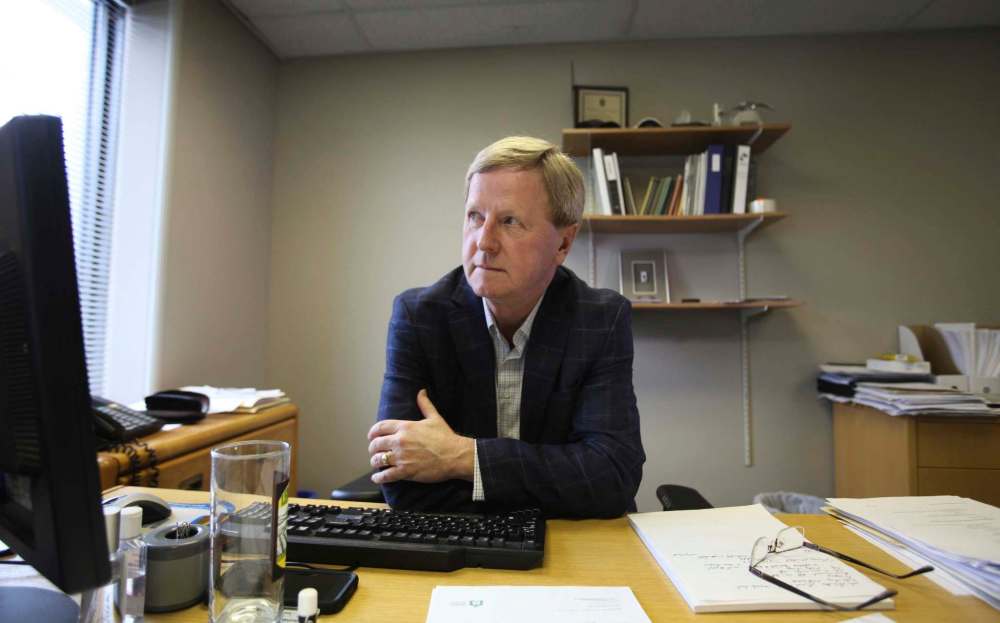Legal action on growth fees ‘only alternative’ for housing industry
Advertisement
Read this article for free:
or
Already have an account? Log in here »
To continue reading, please subscribe:
Monthly Digital Subscription
$1 per week for 24 weeks*
- Enjoy unlimited reading on winnipegfreepress.com
- Read the E-Edition, our digital replica newspaper
- Access News Break, our award-winning app
- Play interactive puzzles
*Billed as $4 plus GST every four weeks. Offer only available to new and qualified returning subscribers. Cancel any time.
Read unlimited articles for free today:
or
Already have an account? Log in here »
Hey there, time traveller!
This article was published 24/01/2017 (2929 days ago), so information in it may no longer be current.
Winnipeg’s development industry has thrown the first punch in its fight with city hall over new growth fees.
The Manitoba Home Builders Association and the Urban Development Institute issued a release this morning that stated they will ask the courts to declare the city’s new impact fee invalid.
The legal challenge, to be filed in Court of Queen’s Bench, will argue the city doesn’t have the authority to impose the fee and the fee is discriminatory, as it only applies to some new residential development.

“The legal validity of the Impact Fee by-law has been in question since day one. We are asking the courts to review this matter in order to clear up the legal uncertainties that are affecting local businesses,” Mike Moore, president of the Manitoba Home Builders’ Association, said in a prepared statement. “The fee this by-law will impose on new-home buyers will be detrimental to Winnipeg taxpayers, tradespeople and the entire construction industry. A fair legal review of the by-law is necessary to ensure jobs are sustained and Winnipeg homeowners are not subject to an indirect and illegal tax from the City.”
Moore told the Free Press the manner in which the city brought along the fee left the industry no choice but to fight it in court.
“We’ve said since Oct. 26, when the bylaw was passed, that we’re looking for a fair and legal process and we don’t feel that happened,” Moore said. “This was really the only alternative left.”
Lawyers representing the development industry and city hall will meet with a judge Feb. 21 to set timelines for the presentation of briefs and affidavits and later hearing dates.
Mayor Brian Bowman said he hasn’t read the industry’s court application but said he’s confident the new fee will withstand a court challenge.
“I would ask the two associations to direct their legal counsel to resolve this quickly,” Bowman said. “We want to move as quickly as possible… we feel our position is strong.”
Bowman said once the legal documents are reviewed, the city will decide whether its own lawyers can handle it or if it needs to hire outside counsel.
Moore said he’s not anticipating an early resolution to the legal challenge, adding while the court might deliver a decision by the end of the year, he added it’s also possible either side could appeal that ruling.
City council approved the impact fee bylaw in October. The fee — about $5,100 for every 1,000 square feet of new residential space — goes into effect May.
The concept of a fee was immediately opposed by the development industry, arguing new development pays more than their fair share for infrastructure related costs. The industry also argued the fee is nothing more than a new tax, which city hall doesn’t have the authority to impose.
The city says the fee is needed to generate revenue to offset the cost of new infrastructure — regional roads, transit, recreation and leisure facilities — for new subdivisions.
The city’s defence strategy was tipped at the end of October by Coun. Brian Mayes, a member of Mayor Brian Bowman’s executive policy committee.
“I think we have a good argument to say this is a regulatory fee; this is not a tax,” Mayes said. “If you take the dough and put it into general revenues, that is a tax. If you take the fees and you implement them in accordance with a complex regulatory scheme, then that is an acceptable fee.”
The fee was fast-tracked last year with no consultation with the public or the development industry. Bowman first raised the concept in February, at the Winnipeg Chamber of Commerce annual mayor’s state of the city luncheon, when he said new developments haven’t been paying for their share of growth-related infrastructure and he wanted to see a new fee imposed to recover those costs.
This wasn’t a new issue. City hall under former mayor Sam Katz had made the same argument in the fall of 2013 but civic administration at the time said the city didn’t have the authority to impose such a fee and asked the then-NDP government to amend the city’s Charter to make it possible. The provincial government refused to grant the request.
A Toronto consulting firm, Hemson Consulting, was hired in May to examine growth related costs. Hemson, a firm which authored similar growth reports for other municipalities, held two information sessions with the development community over the summer and then released its final report at the end of August, which outlined a series of fees to be imposed for all new residential and non-residential development.
The development industry claims that the research and effort undertaken by city hall leading up to the development of the administrative report and bylaw undermine the city’s claim that the fee is a fee — which it can legally impose — and is nothing more than a new tax, which it cannot impose without legislative changes. A study commissioned by the development industry concluded much of the financial information used to support city hall’s argument for development fees is exaggerated or not found in any published civic document.
The administration drafted a bylaw based on the Hemson report. Council later approved the bylaw but reduced the fee amount and had it apply, initially, only to new residential development in select areas on the city’s fringes. Home renovations and affordable housing are also exempt from the new fee. Commercial, office, industrial and institutional developments will be exempt from any fee for two years, and residential infill projects located downtown and in mature neighbourhoods will be exempt for three years.
Money raised from the new fee will go into a dedicated fund used to finance growth-related infrastructure projects,
The development industry remained opposed to the fee, even with the revisions. Moore said in October that the bylaw was “reckless” and “completely unacceptable,” setting up the court challenge.
The administration report that went to council in October reversed the city’s position from 2013, now appearing to rest its new position in favour of the fee on a simple defence: the fee is part of the regulatory arsenal city hall uses to provide for what the Charter defines as the city’s purpose, “the development and maintenance of safe, orderly, viable and sustainable communities, and the promotion and maintenance of the health, safety, and welfare of the inhabitants….
“The goal of the impact fee (the Fee) which would be imposed by the By-law is to assist the City in paying for the costs associated with managing and accommodating growth in Winnipeg thereby reducing the need for these costs to be paid for by taxpayers.”
With files from Kevin Rollason
aldo.santin@freepress.mb.ca
History
Updated on Tuesday, January 24, 2017 1:15 PM CST: New head, adds comments




